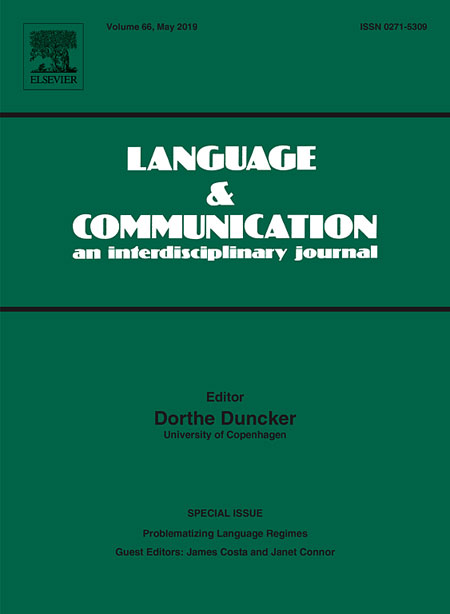Problematizing Language Regimes
James COSTA & Janet E. CONNOR (eds)
Problematizing Language Regimes (volume 66 of Langage & Communication, an Interdisciplinary Journal)

Through several empirical studies, this special issue seeks to question the theoretical relevance of the notion of regimes of language, or linguistic regimes, a notion widely used in sociolinguistics and linguistic anthropology but rarely problematized. To put it simply, the contributors to this issue ask what it means to talk about linguistic regimes, what it means for instance to say that standardization is only one linguistic regime among others (Gal, 2006, p. 17), and how, if at all, this differs from other approaches, in particular in terms of ideologies of language. The reason why questioning the notion of linguistic regimes is important is of course the widespread usage of the term, but it lies also in what problematizing this notion allows us to say about language ideological work, as linguistic anthropologists and sociolinguists.
This collection grew from a panel that Janet Connor and I organised at the American Anthropological Association Congress in 2015 in Denver. The panel’s main hypothesis was that ‘regimes,’ an increasingly ubiquitous notion in linguistic anthropology, were just another way of talking about ideologies, which in turn suggested that this latter term was perhaps somewhat overused. ‘Language ideologies’ have indeed tended, for the past fifteen years at least, to become hegemonic as an analytical lens in such academic disciplines as linguistic anthropology, sociolinguistics, or applied linguistics. In those disciplines, this approach is usually traced back to Silverstein (1979), later to be reinforced by works on language and political economy (Gal, 1989; Irvine, 1989), or by a number of seminal volumes on that theme (e.g. Schieffelin et al., 1998). But perhaps its increased usage has diluted the strength of the term and the success of this notion might thus be its main weakness: everything can now be a language ideology, the term often being used as another way of saying ‘idea about language.’ To quote Marshall Sahlins, ‘[i]n the social sciences, paradigms are not outmoded because they explain less and less, but rather because they explain more and more—until, all too soon, they are explaining just about everything’ (2002, p. 74). This might currently be the stage reached by the notion of language ideologies.
Contents / Table des matières
- Introduction: Regimes of language and the social, hierarchized organization of ideologies, James COSTA (1-5)
- Standardization(s) and regimentation: Polynomic orthodoxies and potentials, Alexandra JAFFE (6-19)
- Regimenting the Gaeltacht: Authenticity, anonymity, and expectation in contemporary Ireland, Bernadette O’Rourke, Sara C. BRENNAN (20-28)
- Regimes of language, whiteness and social class: The negotiation of sociolinguistic privileges by British migrants in rura,l France Aude ETRILLARD (29-40)
- Language regimes and corporeal practices of ‘making known’: Speech action, collective assembly, and the politics of recognition in India, Lisa MITCHELL (41-54)
- Regimes of hearing: Norwegian qualia of quiet and noise as heard through a migrant classroom, Janet E. CONNOR (55-66)
- Regimenting ideologies, Judith T. IRVINE (67-71)
Costa J. & Connor J. E. (eds), 2019, Problematizing Language Regimes (Langage & Communication. An Interdisciplinary Journal, vol. 66, May 2019), Amsterdam: Elsevier, 72 p.
Paru en mai 2019 (en Open Access)

